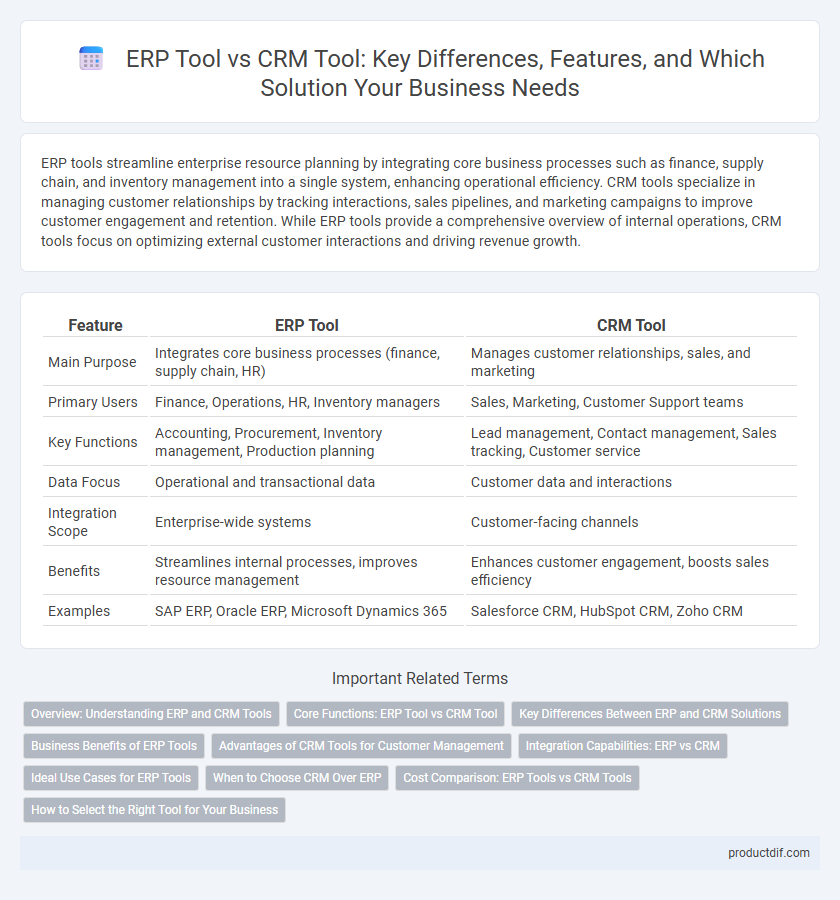ERP tools streamline enterprise resource planning by integrating core business processes such as finance, supply chain, and inventory management into a single system, enhancing operational efficiency. CRM tools specialize in managing customer relationships by tracking interactions, sales pipelines, and marketing campaigns to improve customer engagement and retention. While ERP tools provide a comprehensive overview of internal operations, CRM tools focus on optimizing external customer interactions and driving revenue growth.
Table of Comparison
| Feature | ERP Tool | CRM Tool |
|---|---|---|
| Main Purpose | Integrates core business processes (finance, supply chain, HR) | Manages customer relationships, sales, and marketing |
| Primary Users | Finance, Operations, HR, Inventory managers | Sales, Marketing, Customer Support teams |
| Key Functions | Accounting, Procurement, Inventory management, Production planning | Lead management, Contact management, Sales tracking, Customer service |
| Data Focus | Operational and transactional data | Customer data and interactions |
| Integration Scope | Enterprise-wide systems | Customer-facing channels |
| Benefits | Streamlines internal processes, improves resource management | Enhances customer engagement, boosts sales efficiency |
| Examples | SAP ERP, Oracle ERP, Microsoft Dynamics 365 | Salesforce CRM, HubSpot CRM, Zoho CRM |
Overview: Understanding ERP and CRM Tools
ERP tools integrate core business processes such as finance, supply chain, and human resources into a unified system, enhancing operational efficiency and data accuracy across departments. CRM tools focus on managing customer relationships by tracking sales, marketing campaigns, and customer service interactions to improve client retention and revenue growth. Both systems support business intelligence but differ in scope, with ERP providing enterprise-wide management and CRM specializing in customer-focused activities.
Core Functions: ERP Tool vs CRM Tool
ERP tools centralize core functions like inventory management, finance, procurement, and supply chain operations to streamline business processes across departments. CRM tools focus primarily on customer relationship management features such as contact management, sales tracking, and customer support automation. ERP optimizes internal workflows and resource allocation, while CRM enhances customer interaction and sales pipeline efficiency.
Key Differences Between ERP and CRM Solutions
ERP tools integrate core business processes such as finance, supply chain, and inventory management into a unified system, enhancing operational efficiency and resource planning. CRM tools focus primarily on managing customer interactions, sales pipelines, and marketing campaigns to improve customer relationships and drive revenue growth. The key difference lies in ERP's broad organizational scope versus CRM's targeted approach to customer-centric activities.
Business Benefits of ERP Tools
ERP tools streamline business processes by integrating core functions such as finance, supply chain, and inventory management into a unified system, enhancing operational efficiency and real-time data accuracy. These tools facilitate better resource planning and cost control, leading to improved decision-making and increased profitability. Businesses leverage ERP solutions to automate workflows, reduce manual errors, and support scalable growth across multiple departments.
Advantages of CRM Tools for Customer Management
CRM tools provide comprehensive customer management by centralizing contact information, tracking interactions, and automating follow-ups, which enhances customer relationships and boosts retention rates. These tools offer detailed insights through analytics and reporting features, enabling businesses to personalize marketing efforts and improve sales strategies. Unlike ERP systems that focus on internal processes, CRM software specifically optimizes customer engagement and improves service quality.
Integration Capabilities: ERP vs CRM
ERP tools offer comprehensive integration capabilities across finance, supply chain, and operations modules, enabling seamless data flow and unified business processes. CRM tools specialize in integrating customer data, sales platforms, and marketing automation systems to enhance client relationship management and personalized outreach. Comparing integration strengths, ERP systems prioritize internal operational cohesion, while CRM systems focus on external customer interaction and engagement.
Ideal Use Cases for ERP Tools
ERP tools are ideal for managing complex business processes such as inventory management, financial accounting, and supply chain operations within manufacturing and large enterprises. These tools integrate multiple departments, enabling real-time data sharing and improving operational efficiency across finance, procurement, and production. ERP systems are best suited for companies seeking to automate resource planning and gain a comprehensive view of organizational performance.
When to Choose CRM Over ERP
Choose a CRM tool over an ERP tool when the primary need is to manage customer relationships, lead tracking, and sales pipeline optimization. CRM systems excel in enhancing customer engagement, personalized marketing, and improving sales team collaboration. For businesses focused on boosting revenue through targeted customer insights and relationship management, CRM offers more specialized features than ERP.
Cost Comparison: ERP Tools vs CRM Tools
ERP tools typically involve higher upfront costs and ongoing maintenance fees due to their extensive integration capabilities across multiple business functions, while CRM tools generally have lower implementation expenses and scale more affordably with user count. The total cost of ownership for ERP systems often includes customization, training, and infrastructure investments, contrasting with CRM solutions that prioritize user-friendly interfaces and modular pricing models. Businesses must evaluate the comprehensive financial impact, considering deployment scope, user base, and required features when comparing ERP and CRM tool expenses.
How to Select the Right Tool for Your Business
Selecting the right tool for your business requires analyzing core operational needs and growth objectives to determine whether an ERP or CRM system offers the best fit. ERP tools integrate financial management, supply chain operations, and inventory control, optimizing overall business processes, while CRM tools focus on enhancing customer relationships, sales tracking, and marketing automation. Evaluate factors such as scalability, user interface, integration capabilities with existing software, and industry-specific features to ensure the chosen platform supports long-term business goals.
ERP tool vs CRM tool Infographic

 productdif.com
productdif.com